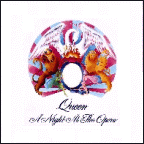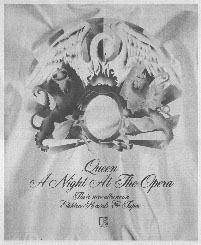![]()
  |

A Night At The Opera
Queen
Elektra 1053
Released: December 1975
Chart Peak: #5
Weeks Charted: 56
Certified Gold: 3/9/76



 In less than three years, with four albums, Queen has risen from the heavy-metal minor leagues to a position approaching that of Led Zeppelin and Deep Purple. But the group has some annoying weaknesses, notably a tendency toward lyrical abstraction. In addition, the imagination that inspired the slick ragtime jazz (with vaudeville overtones) of Sheer Heart Attack's "Bring Back That Leroy Brown" becomes obsessive on A Night at the Opera, where the same stylistic idea is reworked into three songs. But ultimately, the group's willingness to experiment, even when they fail, makes them interesting.
In less than three years, with four albums, Queen has risen from the heavy-metal minor leagues to a position approaching that of Led Zeppelin and Deep Purple. But the group has some annoying weaknesses, notably a tendency toward lyrical abstraction. In addition, the imagination that inspired the slick ragtime jazz (with vaudeville overtones) of Sheer Heart Attack's "Bring Back That Leroy Brown" becomes obsessive on A Night at the Opera, where the same stylistic idea is reworked into three songs. But ultimately, the group's willingness to experiment, even when they fail, makes them interesting.
They have the ability to write first-rate pop/rock songs. Guitarist Brian May's "'39" is his best attempt yet at Paul McCartney-style crooning, but it's on side two that the vocals really take command. On "The Prophet's Song," the best track, May's powerful guitar perfectly complements the rich, multi-tracked harmonies of lead singer Freddie Mercury. Throughout the record, the group makes the most effective use of vocal rounds, choruses and harmonies in the heavy-rock genre since Argent's Ring of Hands.
 Click image for larger view. |
- Kris Nicholson, Rolling Stone, 4-8-76.
Bonus Reviews!
Queen is back with a much more versatile set than any of the British heavy rockers' previous three efforts. While the quality, not overdone, straight ahead rock is still a major factor, good use is also made of folky melodies, fine harmony vocals (both with musical backup and a cappella) and some good soft rock. Some interesting classical influences also present. Writing from three of the quartet adds variety, as does the use of Brian May as lead vocalist on one cut. Classical arrangements also work well and the "No Synthesizers" legend in the credits is a welcome addition these days. Feel of the '20s on several cuts is probably the most fun, but as a total effort, the album works extremely well. Best cuts: "You're My Best Friend," " '39," "Seaside Rendezvous," "The Prophet's Song," "Love Of My Life," "Good Company."
- Billboard, 1975.
- Joel Vance, Stereo Review, 4/76.
This is near enough to the reported mishmash to make me doubt that it sells for what's good about it. Which is that it doesn't actually botch any of a half-dozen arty-to-heavy "eclectic" modes -- even something called "Prophet's Song" sounds OK -- and achieves a parodic tone often enough to suggest more than meets the ear. Maybe if they come up with a coherent masterwork I'll figure out what that more is. Maybe if they come up with a coherent masterwork they'll figure out what that more is. B-
- Robert Christgau, Christgau's Record Guide, 1981.
Queen's A Night at the Opera was a showcase for their inventive and influential "Bohemian Rhapsody." As the sleeve note proudly declares, "No Synthesizers!." Freddie Mercury's vocal and pianistic extravagances and Brian May's manic guitar with multi-tracking, complex processing and manipulation pad out the sound picture -- you really would believe that modern sampling synths had been used here but in 1975 they were not even imagined.
The drawback is that conventional tape and noise reduction systems have been pushed to the very limits. Now heard from CD, these tapes can sound a little compressed and airless, lacking both headroom and the absolute clarity of modern recording techniques.
"Bohemian Rhapsody" manages to pack in one or two dynamic surprises however and shows less tape noise than expected while CD makes the very best of its pan potted effects. A slightly dulled and lifeless sound is revealed.
- David Prakel, Rock 'n' Roll on Compact Disc, 1987.
In case there was any doubt that Queen was devoted to over-the-top effects, this massively overdubbed combination of hard rock and opera, paced by May's monster guitar riffs and Mercury's million-voiced choir and emotive solo singing, should have erased it. Contains "Death on Two Legs," "You're My Best Friend," and, of course, "Bohemian Rhapsody." * * * * *
- William Ruhlmann, The All-Music Guide to Rock, 1995.
No Queen collection is complete without A Night at the Opera (1975) and A Day at the Races (1976). From heavy metal powerhouses to operatic ballads, Queen fills these albums with every sound imaginable, including kazoos and ukulele, without even using synthesizers. In fact, each of these albums features one of the band's operatic opuses -- the seminal "Bohemian Rhapsody" from A Night at the Opera to "Somebody to Love" from A Day at the Races. * * * * 1/2
- Mike Joiner, Musichound Rock: The Essential Album Guide, 1996.
"Queen will be the Cecil B. DeMille of rock," proclaimed singer Freddie Mercury, and this is where the band let its over-the-top tendencies loose, with heavy metal ("Sweet Lady"), pop ("You're My Best Friend)" and the most operatic of all rock songs, "Bohemian Rhapsody."
A Night at the Opera was chosen as the 230th greatest album of all time by the editors of Rolling Stone magazine in Dec. 2003.
- Rolling Stone, 12/11/03.
A Night at The Opera, Queen's fourth album, firmly established the band in the hearts and minds of US music consumers, while it merely served to confirm their status as one of the most popular rock acts in their native UK. The album scored a Number Nine position in the US, bettering its predecessor, Sheer Heart Attack, by three places, while in the UK the album was the band's first chart topper.
The track for which Queen is best known, "Bohemian Rhapsody" was arguably the first track to benefit from having a video. This epic spent nine weeks at the US Number One across Christmas 1975 (selling 1.19 million), though only reaching Number Nine in the UK. It returned to the top of the US charts for a further five weeks at Christmas 1991, a few weeks after the death of lead singer, Freddie Mercury, making it the seventh best-selling single of all time.
Further reading on Super Seventies RockSite!: Album Review: Album Review: Queen I - Article: |
As of 2004, A Night At The Opera was the #77 best-selling album of the 70s.
- Hamish Champ, The 100 Best-Selling Albums of the 70s, 2004.
Since their 1973 debut, Queen's ambitious template had included bombastic classical references, falsetto freak-outs, and pagan mysticism. But it was on album number four that they melded all these into the epic "Bohemian Rhapsody." The six-minute single was the UK No. 1 for nine weeks and made the U.S. Top Ten.
Drummer Roger Taylor remembers frontman Freddie Mercury playing "Bohemian Rhapsody" to the band at the piano. "And here, darlings, is where the opera section starts," he would say. "Freddie had the bare bones, even the composite harmonies, written on scraps of paper," said Taylor, "So it was quite hard to keep track of what was going on."
Nonetheless, with 180 overdubs and a vocal section that took some 70 hours to record, "Bohemian Rhapsody" came to define the band. Its multilayered harmonies (the distortion that came from endless "track bouncing" contributes to the saturated effect), over-the-top balladry (using the same piano McCartney played on "Hey Jude"), and razor-sharp metal guitar are tied together by Mercury's vision, both Nietzschean and camp.
The album has less overblown gems. Bassist John Deacon's Wurlitzer piano-driven "You're My Best Friend" is perhaps the band's most touching love song. Then there is the mystic "39," the Arab-tinged "The Prophet's Song," the English music hall of "Lazing On A Sunday Afternoon," and the ballad "Love Of My Life," a live favorite blending Mercury's flamboyant vocals with guitarist Brian May's acoustic flourishes. "A Night At The Opera featured every sound from a tuba to a comb," declared Mercury. "Nothing is out of bounds."
- John Lewis, 1001 Albums You Must Hear Before You Die, 2005.
"Is this the real life? Is this just fantasy?" With these questions, Queen frontman Freddie Mercury leaves behind the run-of-the-mill jive talk of rock to embark on the epic quest for enlightenment known as "Bohemian Rhapsody." It's six delicious minutes of opera buffa outlandishness, a series of music-theater scenes that borrow everything but the powdered wigs from opera. The show begins with aria-like voice-and-piano passages that catch Mercury in full tragic-hero swoon, and lively exchanges between the lead singer and a thundering, hectoring chorus. Then, just when the geegaws get a little too twee, along comes Brian May with his laser-beam guitar, boogie-stomping all over the stage, determined to purge all pomposity.
The "Rhapsody," immortalized in the comic film Wayne's World, is not the only moment of rococo tongue-in-cheek brilliance that Queen loaded into A Night at the Opera. Fully half of the album tends toward camp -- there are seafaring sing-alongs ("'39") and vaudeville-style soft-shoe tunes ("Seaside Rendezvous") and a few themes that might have been inspired by a toy callipe ("Lazing on a Sunday Afternoon"). Delivered with sly winks and high-gloss dazzle, these put Queen closer, sensibility-wise, to the theatrical entertainments of a bygone age than anything on pop radio.
Yet Queen does also manage to kick it. Tucked between the kitschy, amazingly detailed period pieces are several conventional pop songs -- conventional at least in terms of structure, as the four-piece can't resist pumping up simple themes into tottering spectacles. These include the zooming, cleverly harmonized confession "I'm In Love with My Car" and the savage "Death on Two Legs," which turns on a dizzying multilayered guitar attack. Modest in scale when compared to "Bohemian Rhapsody," these are just as head-spinningly intricate, illustrations of Queen's ability to conjure music of preposterous flamboyance that somehow still manages to flat-out rock.
- Tom Moon, 1,000 Recordings To Hear Before You Die, 2008.
"Queen will be the Cecil B. DeMille of rock," proclaimed Freddie Mercury, and this is where the band let its over-the-top tendencies run wild, with heavy metal ("Sweet Lady"), Paul McCartney-esque pop ("You're My Best Friend"), and the most operatic rock & roll song of all time, "Bohemian Rhapsody."
A Night at the Opera was chosen as the 128th greatest album of all time in a Rolling Stone magazine poll of artists, producers, critics and music industry figures in Oct. 2020.
- Rolling Stone, 10/20.
![]() Reader's Comments
Reader's Comments
No comments so far, be the first to comment.